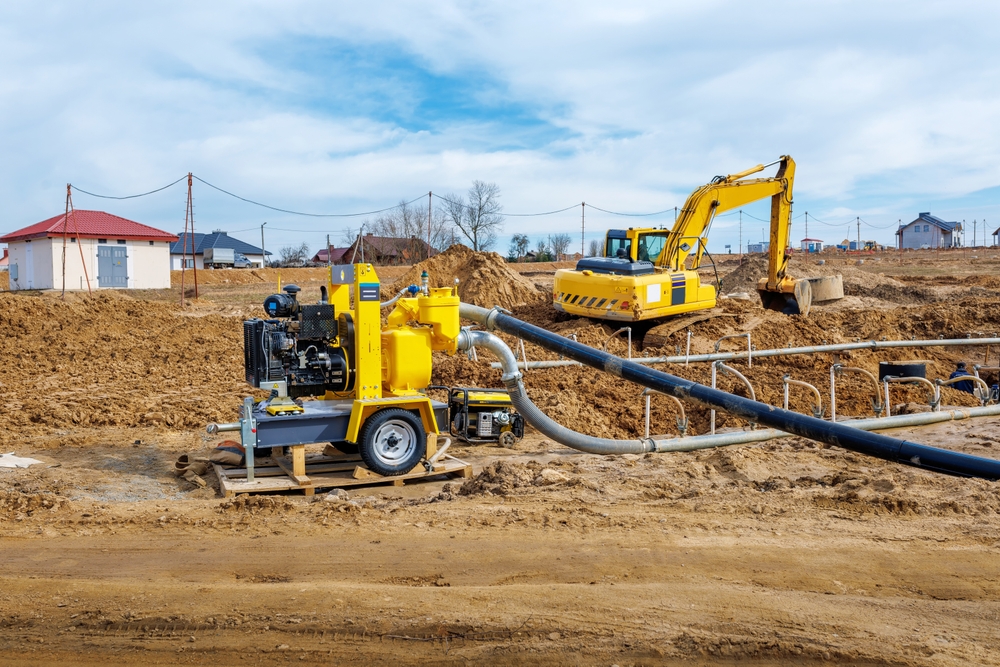
There are a few best management practices (BMPs) that are often necessary for stormwater management on a given site, and dewatering is often high on this list. What is dewatering, and when should you be calling in the experts for significant dewatering jobs?
At Silver Leaf SWPPP, we're here to help clients around Utah and Idaho with all their SWPPP needs, including important BMPs like dewatering, street sweeping and more. What is dewatering, why is it important, and when should you be calling in our team to handle major jobs? Let's take a look!
For those just learning about SWPPP and related services, dewatering can seem like a complicated concept. In simple terms, it refers to the process of removing excess water from a construction site or other location in order to allow for more efficient work and prevent potential damage. This process is typically achieved through specialized equipment such as pumps and drainage systems.
Dewatering serves several important purposes on a construction site or similar location. First and foremost, it allows for easier excavation, grading and other tasks that may be necessary during the building process. Without proper dewatering, these processes may be delayed or even halted entirely due to excess water hindering progress.
In addition, dewatering helps to prevent soil erosion and instability. When waterlogged soil is left untouched, it can become unstable and cause shifts or collapses in the ground, which can pose a threat to both workers and the structural integrity of the building.
Furthermore, dewatering also plays a crucial role in maintaining worker safety. Excess water on a construction site can create slippery surfaces, increasing the risk of slips, trips, and falls for workers. By removing this excess water, dewatering helps to provide a safer working environment for everyone involved.
And like many other SWPPP needs, dewatering is also a compliance requirement under the Clean Water Act and other local regulations. This means that failure to properly manage dewatering can result in fines and penalties.
When should you be calling in the experts to help with dewatering for your site? There are actually a number of examples, as such professionals are often prominently involved in these efforts. They include:
Water that's being discharged from a construction site requires additional permitting in a place like Utah, meaning virtually all dewatering projects require permits. This is one area where SWPPP professionals can be of major assistance. They understand the permit process and are ready to help you get started.
A key part of the regular dewatering process for many sites is taking samples of the discharged water. This is done to ensure that the water is within acceptable limits for pollutants and isn't causing harm to the environment. SWPPP professionals are trained in sampling techniques and can help you set up a sampling schedule to meet your permit requirements.
Once you have a SWPPP in place that includes dewatering, it's important to regularly review and update it as needed. Changes in weather patterns, site conditions, or regulations may require adjustments to your plan. SWPPP professionals can assist with this process by conducting site reviews, updating documents, and ensuring compliance with current regulations.
For many construction projects, time is of the essence. The longer a project takes, the more expenses can add up. By working with SWPPP professionals for your dewatering needs, you can save time and keep your project on track. These professionals have the expertise, resources, and equipment to efficiently implement dewatering measures and minimize delays due to stormwater management.
Additionally, SWPPP professionals are up-to-date with current regulations and best practices for dewatering. This means they can help you navigate any potential regulatory hurdles or concerns that may arise during your project, saving you time and stress in the long run.
In today's environmentally-conscious world, companies are expected to operate in an environmentally responsible manner. Implementing effective dewatering measures not only protects the environment but also reflects positively on your company's reputation.
Utilizing reputable professionals shows that your company takes its environmental responsibilities seriously and cares about the impact it has on the surrounding community. Moreover, proper dewatering practices can prevent potential legal issues and negative publicity that may result from non-compliance with regulations. By investing in professional dewatering services, you are making a proactive effort to protect your reputation and maintain good standing within your industry.
At Silver Leaf SWPPP, we're here to help with all your SWPPP needs, including dewatering and several other best practices. Contact us today for more information, or to get started!